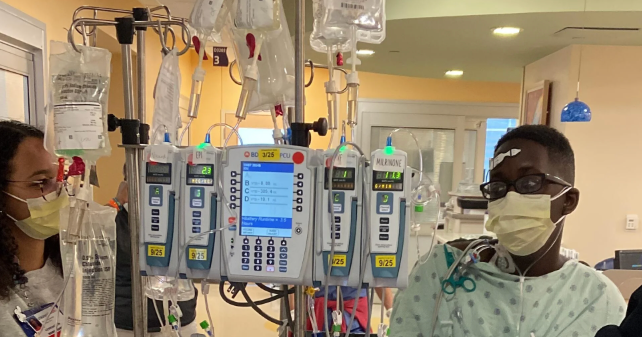‘Tremendous uncertainty’ for cancer research as US officials target mRNA vaccines | Trump administration

As US regulators restrict Covid mRNA vaccines and as independent vaccine advisers re-examine the shots, scientists fear that an unlikely target could be next: cancer research.
Messenger RNA, or mRNA, vaccines have shown promise in treating and preventing cancers that have often been difficult to address, such as pancreatic cancer, brain tumors and others.
But groundbreaking research could stall as federal and state officials target mRNA shots, including ending federal funding for bird flu mRNA vaccines, restricting who may receive existing mRNA vaccines and, in some places, proposing laws against the vaccines.
The Trump administration has also implemented unprecedented cuts to cancer research, among other research cuts and widespread layoffs at the National Institutes of Health (NIH).
At least 16 grants involving the word “mRNA” have been terminated or frozen, according to the crowdsourced project Grant Watch, and scientists have been told to remove mentions of mRNA vaccines from their research applications, KFF Health News reported in March.
Researchers fear that therapeutic cancer vaccines will get “swept up in that tidal wave” against mRNA vaccines, Aaron Sasson, chief of surgical oncology at Stony Brook University, said in April.
When it comes to mRNA breakthroughs, “the next couple of years are the most critical”, Elias Sayour, a professor for pediatric oncology research at the University of Florida, said.
“If the progress we’ve made to date – which has been prodigious – if that is just stopped or stymied, it can absolutely affect the trajectory and the arc,” he said.
The uncertainty around mRNA specifically, and research broadly, could also discourage researchers and institutions from beginning new projects, he said.
“If we continue to seize on these gains in the next 10, 20 years, I do see a scenario where we’ve completely transformed how we take care of a large swath of human disease,” he said.
Research on mRNA cancer vaccines has been under way for more than a decade, with more than 120 clinical trials on treating and preventing cancers. mRNA shots have shown promise for preventing the return of head and neck cancer; lymphoma; breast cancer, which accounts for 11.6% of all cancer deaths in the US; colorectal cancer; lung cancer; and kidney cancer, among others.
Pancreatic cancer has a 10% survival rate and is the second leading cause of cancer deaths in the US, but in a small study, about half of the patients who received an mRNA vaccine did not see their cancer return, and they still had strong immune responses three years later.
Early mRNA vaccine trials also indicated the recurrence of melanoma could be cut in half. And a small study co-authored by Sayour on glioblastoma showed the vaccines started affecting the tumors within 48 hours.
Like any vaccine, mRNA cancer vaccines train the body to recognize and destroy harmful cells.
Unlike foreign pathogens, such as infectious diseases, cancer is caused by the growth of the patient’s own cells.
Some cancer vaccines are highly personalized, using a patient’s own cancer cells to treat their tumors or train their immune system to kill off those dangerous cells if they recur.
“The ability to create specific vaccines for patients has tremendous, tremendous promise, but that was technology not possible five or 10 years ago,” said Sasson. “It really is a shift in the paradigm of how we treat cancers.”
Researchers are also investigating vaccines that would target cancer cells more broadly by identifying “fingerprints” of certain cancers, said Sayour.
Additionally, the vaccines could be created for other conditions, such as type 1 diabetes and multiple sclerosis, he said.
“It has potential to get rid of a lot of the chronic morbidity we see from disease, to cure diseases that are degenerative, to overcome cancer evolution and cure patients,” Sayour said. “mRNA could be the healthcare that the movable-type printing press was for human knowledge.”
Yet federal and state decision-makers have targeted mRNA vaccines in recent months.
Vinay Prasad, director of the Center for Biologics Evaluation and Research at the US Food and Drug Administration (FDA), reportedly overrode scientists at the agency to limit some Covid vaccines, including a new mRNA shot from Moderna, to children older than 12. Prasad also introduced similar limitations on the Covid shot from Novavax, which does not use mRNA.
On Thursday, the FDA approved the original Covid mRNA vaccine from Moderna for children between the ages of six months and 11 years – but they narrowed its use to children with at least one underlying condition. (The vaccine for people older than 12 was approved in 2022.)
Prasad argued, in two memos recently released by the FDA, that the risks of Covid had dropped, while “known and unknown” side-effects could outweigh the benefits of getting vaccinated.
Covid remains a leading cause of death in the US, with 178 deaths in the week ending 7 June, the last week for which the US Centers for Disease Control and Prevention (CDC) offers complete data.
At the meeting of the CDC’s advisory committee on immunization practices (ACIP) in June, two of the new vaccine advisers – appointed by the health and human services (HHS) secretary, Robert F Kennedy Jr, after he fired the previous 17 advisers – broached the safety of Covid mRNA vaccines, indicating future scrutiny of these shots.
Vicky Pebsworth, a registered nurse who has volunteered for years with the National Vaccine Information Center, said she was “very concerned” about side-effects from the Covid mRNA shots and asked for more data on safety, including “reproductive toxicity”.
Shortly before being appointed to the ACIP, Pebsworth and the founder of the National Vaccine Information Center argued that the FDA should not recommend mRNA Covid-19 shots for anyone “until adequate scientific evidence demonstrates safety and effectiveness for both the healthy and those who are elderly or chronically ill”.
At the June ACIP meeting, Retsef Levi, a professor of operations management at the MIT Sloan School of Management, said he believed mRNA side-effects were “being reported at rates that are far exceeding other vaccines even when you normalize to the number of doses, which does suggest something, I think”.
after newsletter promotion
Previously, Levi argued: “The evidence is mounting and indisputable that mRNA vaccines cause serious harm including death, especially among young people. We have to stop giving them immediately!”
Another new ACIP adviser, Robert Malone, has also repeatedly argued against mRNA vaccines.
In 2021, Kennedy, then chair of the anti-vaccine organization Children’s Health Defense, petitioned the FDA to revoke all approvals, and ban future approvals, of all Covid vaccines. He has called Covid shots the “deadliest vaccine ever made”.
In May, Kennedy changed Covid vaccine recommendations from “should” to “may” for children, and eliminated the recommendation for pregnant women entirely.
Also in May, the US canceled $766m in contracts for research on mRNA vaccines against H5N1 bird flu. Investment in the mRNA vaccine was not “scientifically or ethically justifiable”, Andrew Nixon, the HHS communications director, said in statements to the media, adding that the “mRNA technology remains under-tested”.
Millions of mRNA vaccines have been given around the world, and the vaccines have been shown to be safe and effective in multiple studies.
Bans or limitations on mRNA vaccinations have been introduced in seven states. One such bill in Idaho sought to pause “gene therapy immunizations” for 10 years – a category in which they incorrectly place Covid vaccines, and which could affect other therapeutics.
Similarly, in Washington state, commissioners in Franklin county passed a resolution urging the local health facility to stop providing and promoting gene-therapy vaccines; they also incorrectly included Covid mRNA shots in this category.
“There’s this scorched-earth mentality now, but I’m hopeful that once the dust settles, we’ll be able to reinstate or allow vaccine work for cancer purposes to proceed,” Sasson said.
Cancer is the second leading cause of death in the US, and two in five people will be diagnosed with some form of cancer in their lifetime.
There are currently only two FDA-approved vaccines that prevent cancer – hepatitis B and human papillomavirus (HPV) – and both have been targeted by anti-vaccine activists.
In January, Trump hosted the launch of Stargate AI at the White House. The project could eventually identify cancers and develop mRNA vaccines in days, Larry Ellison, the chair of the tech company Oracle who is involved with the project, said at the launch.
The project will be funded by private, not federal, dollars, but the work on cancer would draw upon research on cancer and mRNA, among other fields.
Yet the Trump administration has slashed other critical funding for cancer research, prevention and treatment.
The administration canceled more than $180m in grants through the National Cancer Institute (NCI) in the first three months of its term, and proposed cutting $2.7bn from the cancer center in the next NIH budget.
The administration has cut back funding for some family planning providers, which frequently offer screenings for HPV and other cancer markers.
Lawmakers have also made enormous cuts to Medicaid and insurance through the Affordable Care Act (ACA), which could mean uninsured and underinsured people wait longer for cancer treatment – or forgo it entirely.
“There’s the potential for great harm, for massive public health issues to be set aside during this really broad approach of canceling research,” said Sasson. “There’s significant harm that’s going to happen by these sweeping changes.”
For scientists who still have funding or those who are entering the field, “there’s tremendous uncertainty as to what the future will look like”, Sasson said.
But he is optimistic that mRNA vaccines for cancer and other illnesses will be able to move forward.
Scientists are often portrayed as “just trying to survive” funding cuts, but that’s not entirely accurate, said Sayour, before adding: “I don’t think many people in my field do this because they’re just trying to survive. I would want nothing more, honest to God, than to put myself out of business. We do this because we want to make a difference.”
Sayour echoed concerns about both indirect and direct forces shaping progress on mRNA vaccines.
“But I also want to be optimistic that our best days are ahead of us,” he said.
Source link






